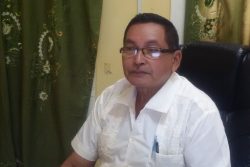The failure of the Public Accounts Committee of Parliament to meet on a regular basis should be a matter of serious concern to citizens. Its role is to help ensure accountability and transparency in government expenditure, something which all sides in our fractious political universe claim they consider desirable. But last week we reported that a recent PAC meeting which had to be aborted owing to the absence of government members represented the ninth occasion on which this had happened. The other cancellations occurred on May 23, July 11, 18 and 25, November 21 and 28 and December 12, 2022, as well as February 6, 2023.
In an ‘Accountability Watch’ column at the end of 2021 Mr Anand Goolsarran explained how the PAC’s work slotted into the public accountability cycle. After the Auditor General’s report is laid in the National Assembly, the PAC scrutinises the accounts in the report, and is then required in turn to submit its determinations to the Assembly. Following this the government responds in the form of a Treasury Memorandum where it will set out what actions it has taken or proposes to take in respect of the Committee’s findings and recommendations. Mr Goolsarran goes on to say that ideally speaking, the cycle should be completed within 12 months of the end of the fiscal year not only so the public can then make their own judgements, but also because it would provide legislators with a source of reference when considering the Estimates for the next fiscal year. “It is undesirable,” he wrote, “for the Assembly to approve the Estimates for the forthcoming fiscal year without first ensuring that a full and proper account has been rendered for the amounts allocated in the previous year to meet expenditure on Government programmes and activities.”
If the PAC is not functioning for whatever reason, it is not difficult to see why there will be a default in terms of government accountability where the public finances are concerned, yet that is the situation in which the country now finds itself. The first delay in its work dates back to the early days of the present government in office, when PPP/C members objected to Mr David Patterson as chair of the Committee on account of the fraud allegations which had been made against him. It has to be explained that while the PAC’s seat allocation reflects the distribution of seats in Parliament at large, allowing for five government members and four opposition ones, under the rules the chair always has to come from the opposition. In the end the matter was resolved with the election of Mr Jermaine Figueira as chairman.
Then in a more bizarre development Clerk of the National Assembly Sherlock Isaacs wrote to Chairman Figueira the following year informing him he would be unable to provide a clerk for the meetings which were then imminent because the clerk of the PAC had developed health issues on account of high stress. Other clerks too were unwilling to provide service owing to the “unprofessional conduct of some members of this Committee, which is not conducive to a healthy working environment,” said Mr Isaacs. Whatever the truth of the matter, the onus was on him to appoint a clerk and not allow the situation to deteriorate to a point where the PAC could not function. In the end, a clerk was found.
If that was an interlude presumably unconnected to our customary political contentions some of the disagreements which followed were not so far removed. Inevitably there is now a backlog of accounts to be reviewed, and in a move to speed up the work Mr Figueira had proposed the PAC meet twice a week instead of once. After considerable back and forth the issue was eventually put to a motion where the PPP/C members used their majority to reverse the decision maintaining it would have an adverse impact on the work of both ministers of government who sit on the Committee as well as the advisors to that Committee ‒ the Finance Secretary, the Auditor General and the Accountant General. Where the latter are concerned, Mr Goolsarran has pointed out that there is no requirement for them to be personally present at meetings; they can send their deputies or other senior officers instead, and that this had been done in the past.
As for the ministers, Mr Figueira has adverted to the fact that when the Minister of Parliamentary Affairs and Governance Gail Teixeira was in opposition she had suggested that ministers of government not sit on the PAC because of their commitments and heavy workload. Now she appears to have forgotten her earlier stance, or perhaps finds it no longer convenient in terms of government objectives. In the case of two aborted meetings of the Committee, government Ministers Juan Edghill, Vishwa Mahadeo and Gail Teixeira were at the opening of the National Toshaos’ Conference on the one of July 11, while where that of May 23 was concerned, Ms Teixeira proffered the rather feeble excuse that the non-attendance of government members was not deliberate and was due to national emergencies and illness.
Mr Goolsarran has supplied a very pertinent reason why ministers should not sit on such a committee quite apart from the demands of their workload. There is the possibility of a conflict of interest, he says, when the PAC begins to scrutinise the accounts of budget agencies for which they hold ministerial responsibility. There is no sign that Ms Teixeira intends to take that important reservation on board.
The indefensible cancellation of so many meetings has been made possible by the fact that the government went to Parliament to get a motion passed changing the rules for a PAC quorum. Under the traditional system a quorum constituted three members with no specification about their political affiliation. The new one requires five members, two from either side of the House plus the chairman. Minister Teixeira was reported as saying that it offered protection to both sides of the National Assembly – a clear political rationalisation if ever there was one. She also observed that on two occasions while the government side of the House was absent the opposition made decisions without their input.
She was not recorded as saying what those decisions were. Are we to believe that after all this time – and there have been periods in the past when the PAC has done commendable work, its political divisions notwithstanding – that neither side on its own can be trusted to recognise and follow up on derelictions or other forms of delinquency in the management of the public accounts highlighted in the Auditor General’s report? And that they will omit to call in the relevant officials? Or refrain from asking them the appropriate questions? If indeed it is the case as she believes that an unbiased approach requires both political sides to be present, then she should ensure that her side attends meetings. Without meetings oversight cannot proceed. And if ministers cannot meet their obligations, take them off the Committee, not least for the reason Mr Goolsarran has cited.
It might be noted that the May 23, 2022 aborted meeting came after the passage of the motion to change the quorum. But if the purpose of changing the quorum was the reason given by the Minister of Governance, why have there been so few meetings since? Is it because the ruling party does not want genuine participation in a committee it does not control? The impression is given that the government sees its duty as concentrating on the possible nonfeasance and misfeasance of the APNU+AFC government while in office, not on its own transgressions.
This comes across strongly in the current dispute among PAC members about how the reports should be reviewed. The Committee is currently looking at the audited reports of 2017, 2018 and 2019 simultaneously because in the opposition view this mode of procedure is necessary to clear the backlog. It might be noted that according to Mr Goolsarran what he called the “unprecedented approach” of considering several years of the public accounts together had been adopted in the past. He listed the years 1995-1998, 2000-2001, 2002-2003, 2004-2005, 2007-2008, 2010-2011 and 2012-2014 as falling into that category.
Minister Teixeira’s argument as expressed in correspondence to Mr Figueira last year is that the years 2019 and 2020 represented a period when the Granger administration was functioning as a caretaker government, and that the 2019 Budget was executed without oversight, while for 2020 there were no budget allocations or an Appropriation Act. As a consequence this period required greater scrutiny and time. It can only be remarked that while these years may well require greater scrutiny, in terms of the volume of accounts they probably do not need the expenditure of a great deal of extra time. Heavy spending did not occur in those years; that is something which has happened more recently with the advent of this government and the oil economy. In any case with its majority on the PAC it is in a position to ensure that whatever needs to be investigated in depth, can be.
The public is tired of the political games which are obstructing the work of a vital committee like the PAC. In this instance it is the government which must accept most of the blame for the failure of that body to discharge its primary duty of reviewing government spending in as objective a way as possible. It behoves the government to ensure firstly, that the Committee meets regularly so as to clear the backlog; that it removes ministers who are likely to be in a conflict of interest situation and whose workload in any case makes them unsuitable for membership; and that it commits to the principal of impartiality – as should the opposition members. Citizens are not interested in political point-scoring; they are interested in genuine accountability in governmental affairs.








